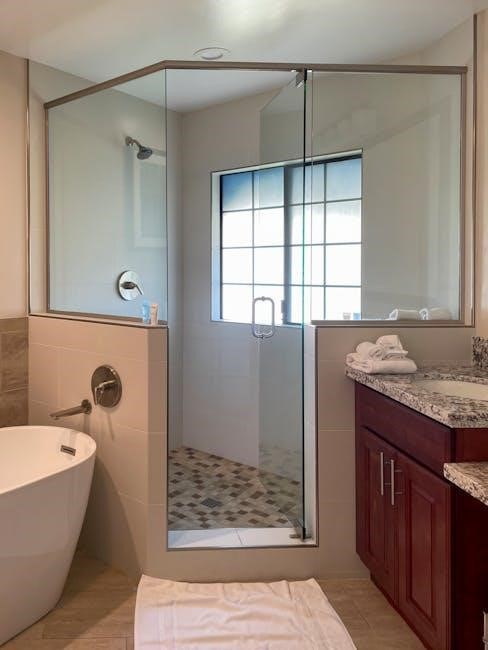A written contract is essential for all home improvement projects in California exceeding $500‚ ensuring clarity and legal compliance for both contractors and homeowners.
The California Contractors State License Board (CSLB) enforces specific requirements‚ including detailed project descriptions‚ payment terms‚ and legal disclosures to protect all parties involved.
These contracts must include clauses like cancellation rights‚ warranties‚ and insurance details to ensure transparency and accountability throughout the project execution process.
Overview of California Home Improvement Contract Requirements
In California‚ any home improvement project valued at more than $500 requires a written contract that adheres to specific legal standards. This ensures transparency‚ accountability‚ and protection for both homeowners and contractors. The contract must include essential elements such as a detailed project description‚ payment terms‚ and the contractor’s license information. Additionally‚ it must outline the rights and responsibilities of all parties involved‚ including cancellation rights and warranty provisions.
The California Contractors State License Board (CSLB) enforces these requirements to safeguard consumers and maintain industry integrity. Contractors must also provide disclosures about insurance‚ lien rights‚ and dispute resolution processes. Compliance with these regulations helps prevent disputes and ensures that all projects are executed legally and ethically.
Importance of a Written Contract in California
A written contract is crucial for home improvement projects in California as it provides a legally binding agreement between contractors and homeowners. It outlines project scope‚ payment terms‚ and responsibilities‚ reducing misunderstandings and disputes. Additionally‚ it ensures compliance with California laws‚ such as those enforced by the CSLB‚ protecting both parties. A well-drafted contract also includes cancellation rights‚ warranties‚ and insurance details‚ offering peace of mind. Without it‚ parties risk legal complications‚ financial loss‚ and project delays. Thus‚ a written contract is essential for a smooth and secure home improvement process in California.

California Home Improvement Contract Legal Requirements
California law mandates specific elements in home improvement contracts‚ including project scope‚ payment terms‚ and disclosures‚ enforced by the CSLB to ensure consumer protection and compliance.
Mandatory Elements as per California Civil Code
The California Civil Code outlines specific requirements for home improvement contracts‚ ensuring transparency and consumer protection. Contracts must include the contractor’s license number‚ a detailed project description‚ and a breakdown of materials and services provided. Payment terms‚ including the total cost and payment schedule‚ must be clearly stated. The contract must also include a notice of the homeowner’s right to cancel within three or five days‚ depending on the circumstances. Additionally‚ contractors must provide proof of insurance and disclose any potential liens that could affect the property. These elements are designed to protect both homeowners and contractors‚ ensuring that all parties are aware of their rights and responsibilities. Compliance with these requirements is enforced by the CSLB‚ helping to maintain trust and fairness in home improvement transactions.
Role of the Contractors State License Board (CSLB)
The Contractors State License Board (CSLB) plays a crucial role in regulating and overseeing home improvement contracts in California; As part of the Department of Consumer Affairs‚ the CSLB ensures that contractors comply with state laws and regulations. It licenses contractors‚ investigates complaints‚ and enforces penalties for non-compliance. The CSLB also provides resources to consumers‚ such as guides on avoiding liens and understanding contract requirements. Contractors must register with the CSLB and adhere to specific guidelines when executing home improvement contracts. The board’s oversight helps protect homeowners from fraudulent practices and ensures that contractors operate ethically and professionally. By visiting the CSLB website or contacting them directly‚ consumers and contractors can access vital information to navigate the complexities of home improvement projects successfully.

Key Components of a California Home Improvement Contract
- Project Description: Detailed scope of work‚ materials‚ and services.
- Payment Terms: Schedule‚ methods‚ and total cost.
- Legal Clauses: Cancellation rights‚ warranties‚ and insurance.
- Compliance: Adherence to CSLB regulations and state laws.
These components ensure transparency‚ protect both parties‚ and guarantee legal compliance.
Project Description and Scope of Work
The project description outlines the specific tasks‚ materials‚ and services to be provided‚ ensuring clarity for both contractor and homeowner. It must detail all labor‚ services‚ and materials included in the agreement. This section should specify the start and completion dates‚ ensuring both parties understand the timeline. Additionally‚ any plans or blueprints must be attached to the contract. The scope of work must be comprehensive‚ leaving no room for ambiguity. This ensures that all parties are aligned and reduces the risk of disputes. Proper documentation is crucial to avoid misunderstandings and ensures compliance with California’s legal requirements.
By clearly defining the project’s parameters‚ the scope of work protects both the contractor and the homeowner‚ providing a clear roadmap for the project’s execution.

Payment Terms and Schedules
Payment terms and schedules are critical components of a California home improvement contract‚ outlining the total cost‚ payment methods‚ and timelines. The contract must specify how payments will be made‚ including the amount‚ due dates‚ and acceptable payment methods. For projects exceeding $500‚ California law requires clear payment schedules to protect both parties. Typically‚ payments are tied to project milestones‚ ensuring work progression aligns with compensation. The contract should also detail any conditions that may affect payment‚ such as delays or changes in scope. Penalties for late payments and the process for handling payment disputes should be included. This section ensures transparency and accountability‚ preventing financial misunderstandings and ensuring smooth project execution. Proper documentation of payment terms is essential for compliance with California’s legal standards.

Special Provisions in California Home Improvement Contracts
These contracts include mechanics lien warnings and liability clauses to protect homeowners from potential liens if contractors fail to pay subcontractors or suppliers.
Mechanics Lien Warning and Liability Clauses
A California home improvement contract must include a mechanics lien warning to inform homeowners about potential liens on their property if contractors or subcontractors are not paid. This clause ensures transparency and protects homeowners from financial liability for unpaid debts related to the project. The CSLB emphasizes the importance of such disclosures to prevent legal disputes. If a contractor fails to pay suppliers or workers‚ a mechanics lien can be filed against the property‚ forcing the homeowner to cover the debt or face foreclosure. To avoid this‚ the contract outlines the contractor’s responsibility to pay all parties involved. Homeowners are advised to verify that all payments are made and that lien releases are obtained upon project completion. This provision safeguards both parties and ensures a smooth transaction.
Insurance Requirements and Disclosures
In California‚ home improvement contracts must include specific insurance requirements to protect homeowners and workers. Contractors are required to maintain general liability insurance and workers’ compensation insurance to cover accidents or injuries during the project. The contract must disclose the types of insurance‚ policy numbers‚ and coverage limits to ensure transparency. This protects homeowners from potential liability for workplace accidents or property damage caused by the contractor or subcontractors. Failure to provide proper insurance documentation can result in penalties or invalidation of the contract. These disclosures are mandated by the CSLB to ensure compliance with state laws and to safeguard both parties involved in the project. Proper insurance coverage is a critical component of a legally binding and protective home improvement contract in California.
Contractor and Consumer Rights in California
In California‚ both contractors and consumers have defined rights under home improvement contracts. Consumers are granted a three-day or five-day cooling-off period to cancel agreements‚ while contractors are protected against unjust liens if they fulfill contractual obligations. These rights are enforced by the CSLB to ensure fairness and compliance with state laws‚ providing a balanced framework for all parties involved in home improvement projects;
Three-Day or Five-Day Right to Cancel Clause
In California‚ consumers have a legal right to cancel a home improvement contract within three or five business days from the date of signing. This cooling-off period allows homeowners to review the agreement and withdraw without penalty‚ ensuring they are fully comfortable with the terms. The specific timeframe depends on the type of contract and the circumstances under which it was signed. For example‚ contracts signed in the homeowner’s residence typically have a three-day cancellation period‚ while other agreements may allow five days. The contract must include a Notice of Cancellation form‚ detailing the process for exercising this right. Failure to provide this form can extend the cancellation period‚ emphasizing the importance of compliance with California law to protect both consumers and contractors. This clause is a critical safeguard‚ ensuring transparency and fairness in home improvement transactions.
Warranty and Guarantee Provisions
California home improvement contracts must include specific warranty and guarantee provisions to protect homeowners and ensure accountability. Contractors are legally required to provide a minimum one-year warranty for labor and materials‚ covering defects in workmanship and materials. This provision ensures that any issues arising from the project are addressed at no additional cost to the homeowner. Additionally‚ contractors must disclose any manufacturer warranties for materials used in the project. These clauses are enforced by the California Contractors State License Board (CSLB) to maintain high standards of quality and consumer protection. By including these provisions‚ contractors demonstrate their commitment to delivering durable and satisfactory results‚ while homeowners gain peace of mind knowing they are legally protected against substandard work or faulty materials.